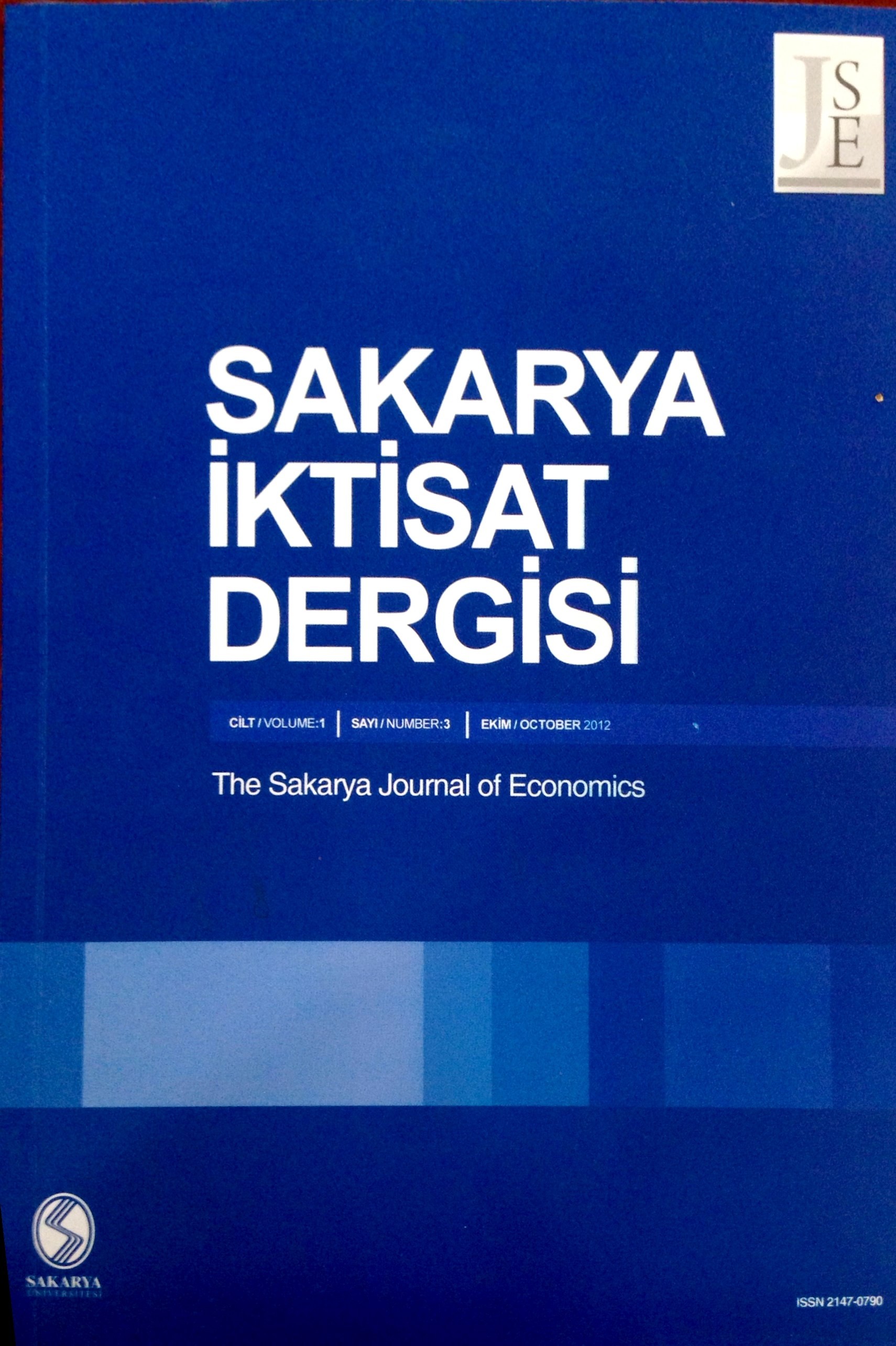DÖVİZ KURU OYNAKLIĞI VE EKONOMİK BÜYÜME: TÜRKİYE ÖRNEĞİ
Döviz kuru oynaklığı ve ekonomik büyüme arasındaki ilişki ilgi uyandıran araştırma konularındandır. Döviz kuru oynaklığı, yatırımı ve bununla bağlantılı olarak ekonomik büyümeyi nasıl şekillendirmektedir? Literatürde bu soruya cevap arayan çok sayıda çalışma mevcuttur. Çalışmada bu soruya reel döviz kuru oynaklığının Türkiye’de çıktı üzerindeki etkileri üzerinden cevap aranmaya çalışılmıştır. Bu çalışmada Türkiye’nin reel gayri safi yurt içi hasılası (RG) üzerinde tüketici fiyat endeksi(TÜFE), gayri safi sabit sermaye oluşumu (SSO), doğrudan yabancı sermaye yatırımı (DYSY) ve döviz kuru oynaklığı (OYN) etkileri 1998:Ç1 den 2014:Ç3’e kadar üçer aylık veriler kullanılarak incelenmiştir. ARDL Sınır Testi yaklaşımına göre değişkenler arasında uzun dönemli bir ilişkinin var olduğu sonucuna ulaşılmıştır. TÜFE ve SSO değişkenleri RG üzerinde pozitif ve anlamlı bir etkiye sahipken, DYSY değişkeninin katsayısı da pozitiftir fakat anlamlı değildir. OYN değişkeni RG üzerinde negatif ve anlamlı bir etkiye sahiptir. Bu sonuç, Türkiye’de reel döviz kurunda yaşanan dalgalanmaların çıktı üzerinde olumsuz etkilere sahip olduğunu göstermektedir
Anahtar Kelimeler:
Reel Döviz Kuru Oynaklığı, Ekonomik Büyüme, ARDL Sınır Testi
EXCHANGE RATE VOLATILITY AND ECONOMIC GROWTH: THE CASE OF TURKEY
The relation between the real exchange rate volatility and economic growth is among the remarkable study topics. How does this exchange rate volatility shape the investment and economic growth? In literature, there exist many studies that seek an answer to this question. In this study, an answer is searched for this mentioned question by investigating the impacts of real exchange rates over the output growth in Turkey. In this study, the impacts of consumer price index (CPI), gross fixed capital formation (GFCF), foreign direct investment (FDI) and real exchange rate volatility (RERV) on real gross domestic product (RGDP) of Turkey, are investigated using data of quarterly periods from 1998:Q1 to 2014:Q3. In reference to ARDL bounds test approach, it is concluded that there has been a long term relation among the variables. While CPI and GFCF variables have a positive and statistically significant impact on RGDP, the coefficient of FDI variables is also positive but not significant. RERV variable has a negative and statistically significant impact on RGDP. This result shows that the real exchange rate volatility in Turkey have negative impacts on the output
Keywords:
Real Exchange Rate Volatility, Economic Growth, ARDL Bounds Test,
- ISSN: 2147-0790
- Yayın Aralığı: Yılda 4 Sayı
- Başlangıç: 2012
- Yayıncı: Sakarya Üniversitesi
Sayıdaki Diğer Makaleler
EKONOMİK BİR SİSTEM OLARAK REFAH DEVLETİ
MALİ TEŞVİKLERİN YATIRIM KARARLARINA ETKİSİ SAKARYA İLİ ÖRNEĞİ
Harun KILIÇASLAN, Zeynep KILIÇ
DÖVİZ KURU OYNAKLIĞI VE EKONOMİK BÜYÜME: TÜRKİYE ÖRNEĞİ
TÜRKİYE İLE RUSYA FEDERASYONU TİCARİ İLİŞKİLERİ: VERGİLER, KRİZLER, İŞBİRLİĞİ VE BEKLENTİLER
Raşit GÜLTEKİN, Mustafa Erkan ÜYÜMEZ
EV HİZMETİNDE ÇALIŞANLARIN SOSYAL GÜVENLİĞİ: ÇALIŞAN VE ÇALIŞTIRAN EKSENİNDE BİR DEĞERLENDİRME
